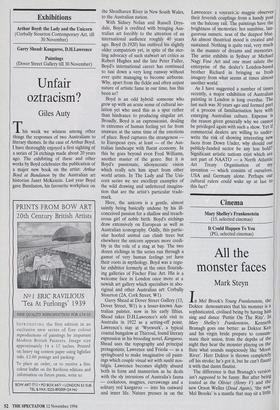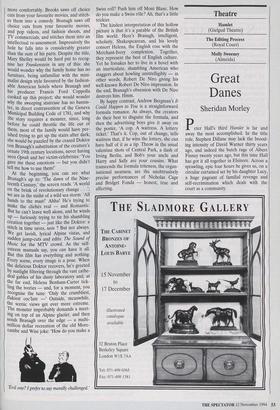Cinema
Mary Shelley's Frankenstein (15, selected cinemas)
All the monster faces
Mark Steyn
In Mel Brook's Young Frankenstein, the Doktor demonstrates that his monster is a sophisticated, civilised being by having him sing and dance 'Puffin On The Ritz'. In Mary Shelley's Frankenstein, Kenneth Branagh goes one better: as Doktor Ken and his virgin bride prepare to consum- mate their union, from the depths of the night they hear the monster playing on the flute what sounds suspiciously like 'Moon River'. Herr Doktor is thrown completely off his stroke; he's got it, but he can't flaunt it with that damn flautist.
The difference is that Branagh's version isn't supposed to be funny. But after being touted as the Olivier (Henry I/) and the new Orson Welles (Dead Again), 'the new Mel Brooks' is a mantle that may sit a little more comfortably. Brooks saws off choice cuts from your favourite movies, and stitch- es them into a comedy. Branagh saws off choice cuts from your favourite movies, and pop videos, and fashion shoots, and TV commercials, and stitches them into an intellectual re-assessment. Impressively the hole he falls into is considerably greater than the sum of his parts. Despite the title, Mary Shelley would be hard put to recog- nise her Frankenstein in any of this: she would wonder why the family home has no furniture, being unfamiliar with the mini- malist design style favoured by the fashion- able American hotels where Branagh and his producer Frantis Ford Coppolla cooked up this project; she would wonder why the sweeping staircase has no bannis- ter, in direct contravention of the Geneva Municipal Building Code of 1781, and why the story requires a monster, since, long before he could throttle the life out of them, most of the family would have per- ished trying to get up the stairs after dark; she would be puzzled by the crazed Doktor von Branagh's substitution of the creature's ornate 19th century locutions, never having seen Oprah and her victim-celebrities: 'You gave me these emotions — but you didn't tell me how to use them!'
At the beginning, you can see what Branagh's up to: The dawn of the Nine- teenth Century,' the screen reads. 'A world on the brink of revolutionary change . • •'; we are in the midst of a wild sea storm: 'All hands to the mast!' Ahha! He's trying to make the clichés real — and Romantic. But he can't leave well alone, and he winds 41:1 — furiously trying to tie his shambling creation together — just like the Doktor: a stitch in time saves, nein ? But not always. We get lavish, lyrical Alpine vistas, and sudden jump-cuts and edits: The Sound of Music for the MTV crowd. As the self- esteem manuals say, you can have it all. But this film has everything and nothing. Every scene, every image is a pose. When the delirious Doktor recovers, he's greeted by sunlight filtering through the vast cathe- dral gables of his dusty laboratory and, at the far end, Helena Bonham-Carter tick- ling the ivories — and, for a moment, you recognise the tune: 'Only the crumbliest, flakiest coc'late —' Outside, meanwhile, the scenic views get ever more extreme. The monster improbably demands a meet- ing on top of an Alpine glacier, and then sends Branagh over the edge — a multi- million dollar recreation of the old More- cambe and Wise joke: 'How do you make a `Evil one? I prefer to say morally challenged.' Swiss roll? Push him off Mont Blanc. How do you make a Swiss role? Ah, that's a little trickier.
The kindest interpretation of this hollow picture is that it's a parable of the British film world. Here's Branagh, intelligent, scholarly, Shakespearean, and his lovely consort Helena, the English rose with the Merchant-Ivory complexion. Together, they represent the best of English culture. Yet he forsakes her to live in a hovel with an inarticulate, shambling American who staggers about howling unintelligibly — in other words, Robert De Niro giving his well-known Robert De Niro impression. In the end, Branagh's obsession with De Niro destroys him. Hmm.
By happy contrast, Andrew Bergman's It Could Happen to You is a straightforward formula romance. As always, the creators do their best to disguise the formula, and then the advertising boys give it away on the poster, 'A cop. A waitress. A lottery ticket.' That's it. Cop, out of change, tells waitress that, if he wins the lottery, she can have half of it as a tip. Throw in the usual valentine shots of Central Park, a dash of Irving Berlin, and Bob's your uncle and Harry and Sally are your cousins. What transcends the formula triteness, the organ- isational neatness, are the unobtrusively precise performances of Nicholas Cage and Bridget Fonda — honest, true and affecting.



































































 Previous page
Previous page